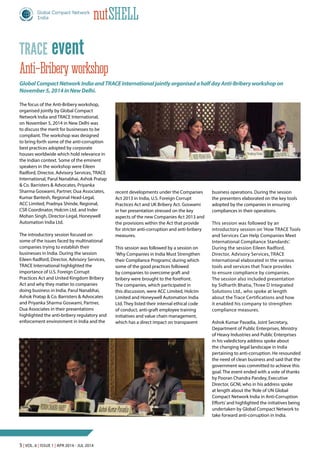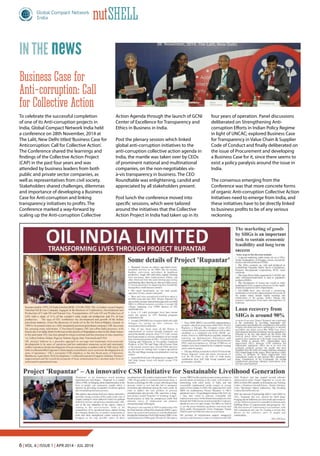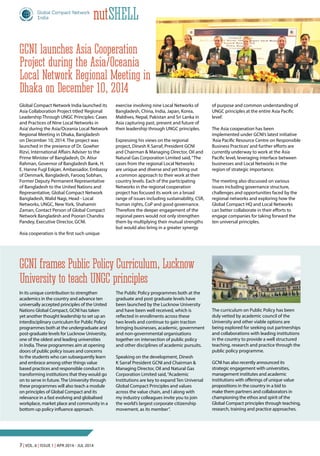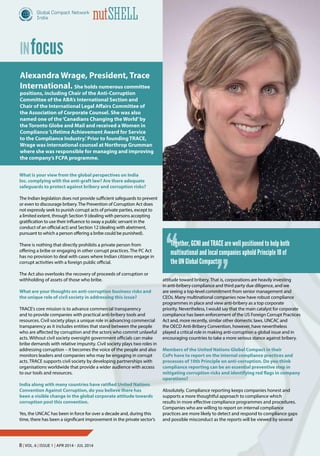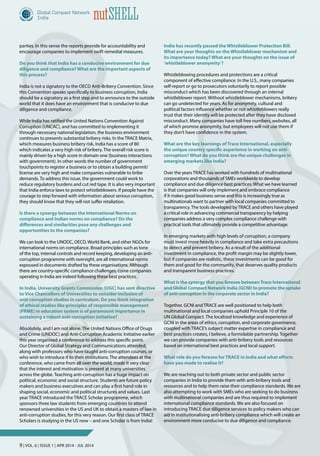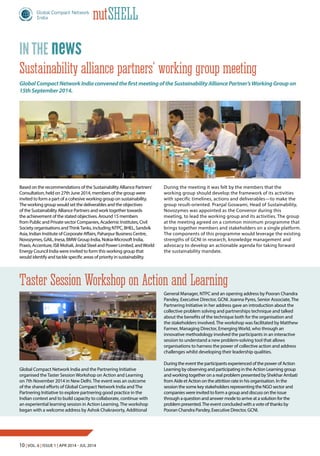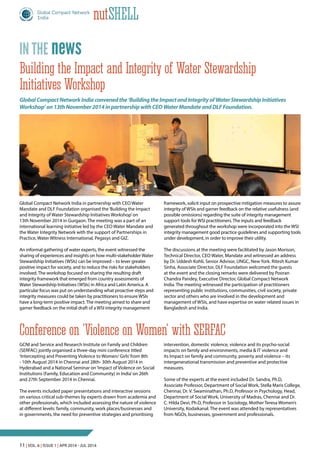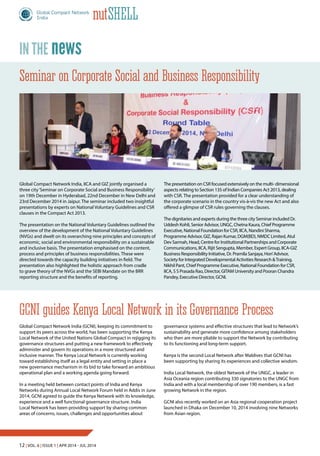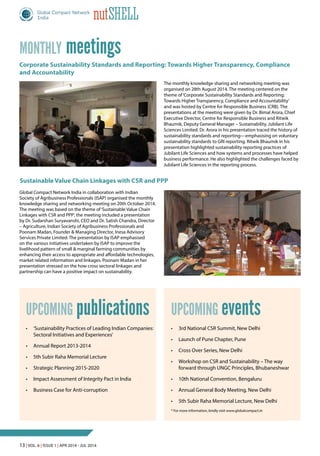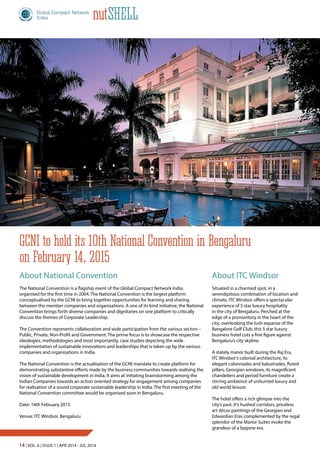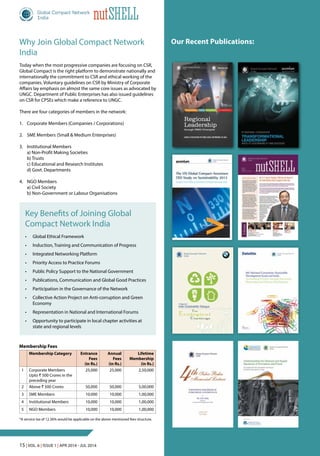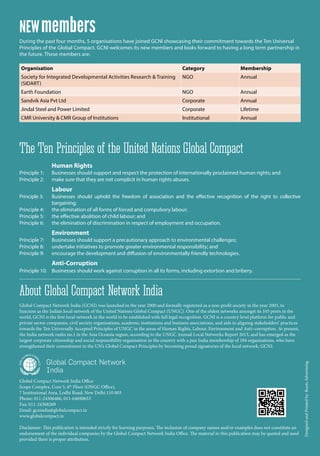The document summarizes a newsletter published by the Global Compact Network India (GCNI). It discusses the launch of GCNI's new initiative called the "Cross-Over Series" in Bengaluru, India. The series is aimed at promoting networking, knowledge exchange, and policy advocacy around the UN Global Compact principles. It also discusses subsequent events in the series held in other Indian cities on topics like the role of corporate social responsibility in education. The newsletter provides details on the objectives, participants, and key discussions at these events. It also summarizes GCNI's other activities in the period like engaging with academic institutions and launching an Asia-Pacific resource center on responsible business practices.
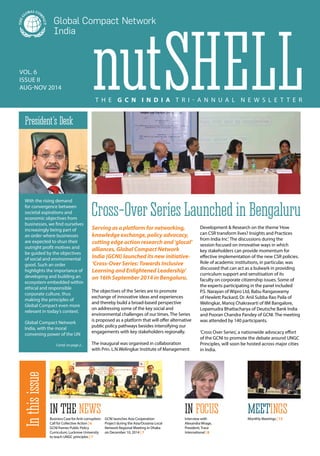
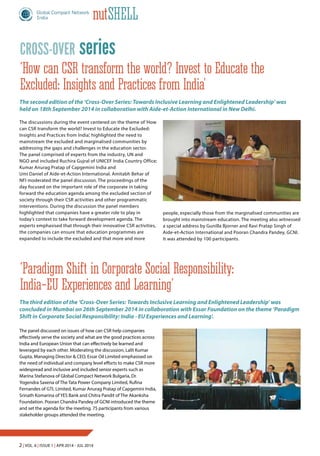
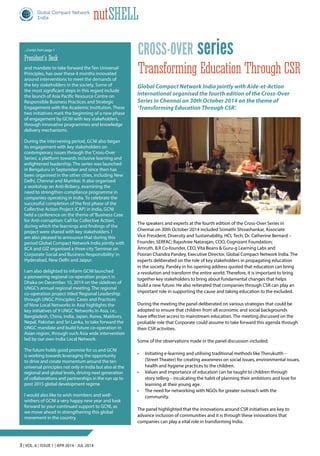
![4 | Vol. 6 | Issue 1 | Apr 2014 - Jul 2014
nutShell
Companies
Act, 2013
Apart from the provisions requiring
mandatory rotation of auditors [§139],
appointment of independent directors and
placing great emphasis on their integrity,
impartiality and autonomy [§149], the Act
also makes‘fraud’a ground for winding-
up a company. Thus, if it is found that a
company was formed for a fraudulent or
unlawful purpose or its affairs are found
to be conducted in a fraudulent manner, it
may be wound up [§271].
The term‘fraud’in relation to affairs of a
company has been explained in §447 of the
new Act rather broadly and includes‘any
act, omission, concealment of any fact or
abuse of position committed by any person
or any other person with the connivance,
in any manner, with intent to deceive, to
gain undue advantage from, or to injure the
interests of, the company or its shareholder
or its creditors or any other person, whether
or not there is any wrongful gain or loss’.
While the provision is yet to take effect, it
is being seen as a robust measure to check,
among others, acts of corruption.
Auditors found to have acted in a
fraudulent manner or abetting / colluding
in a fraud can be removed [§140] and if
they contravene any provisions of the Act
to deceive a company they can be punished
with imprisonment or imposition of a hefty
fine [§147].
transparency and accountability in
operations, listed companies (and other
companies, as prescribed) are required
to constitute an Audit Committee, which
would, among others, be required to
evaluate internal financial controls
and risk management systems [§177].
Further, if it is found that the accounts of
a company were prepared in a fraudulent
manner or that the affairs of a company
were mismanaged during a particular
period – casting a doubt on the reliability
of financial statements – the accounts
may be reopened [§130]. Investigations
relating to frauds pertaining to a
company shall be undertaken by
the Serious Fraud Investigation Office
[§211].
These are only some of the several
provisions which have been introduced
in the new Act for placing special
statutory emphasis on ethics, integrity
and governance in corporate conduct.
Quite a few of these provisions are being
seen as aimed at combating corruption
and fraud. If imbibed and followed in the
right earnest, these provisions would also
help companies protect and nurture their
corporate reputations and the interests
of their shareholders. One also hopes
that once these provisions take effect, a
strong enforcement mechanism is put in
place to combat corporate corruption.
Priyanka Sharma Goswami is a
Partner with Dua Associates, a
leading full service law firm in India.
She is based at the Firm’s offices
in New Delhi and practices in the
field of Litigation & Arbitration. Her
practice focuses on matters relating
to constitutional and administrative
law, contract, specific relief,
environmental law, white collar
crimes and anti-corruption.
EchoingthenewGovernment’sfocuson
‘maximumgovernance’andthe10thprinciple
oftheUNGlobalCompact,thenewCompanies
Actof2013inIndiahasintroducedseveral
provisionsthatfocusonimprovinginternal
processofcompanies,goodgovernanceand
combatingcorruptconduct.Inadeparture
fromthedaysoftheLicenseRajhowever,
thenewActdoesnotmaketheregulatory
frameworktoocumbersomeorunduly
restrictive.
With the aim of improving internal
financial controls, the Act stipulates that
the making of false statements in any
return, report, financial statement etc.
is punishable with imprisonment and
imposition of fine [§448]. For ensuring](https://image.slidesharecdn.com/nutshell-150202104743-conversion-gate01/85/NutShell-GCNI-Tri-annual-Newsletter-Aug-2014-Nov-2014-4-320.jpg)
